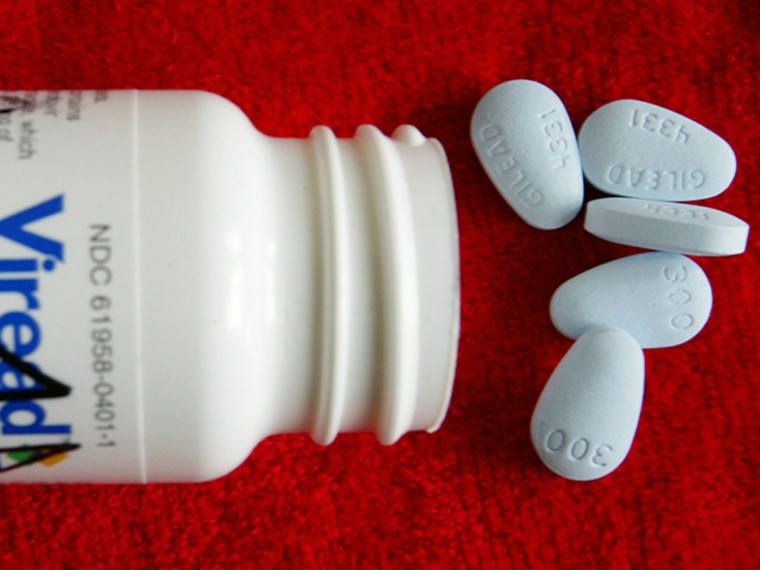A once-a-day pill can protect people who inject drugs such as heroin from the AIDS virus, lowering their risk by nearly 50 percent, researchers reported Wednesday.
The findings show that even people at the highest risk of being infected with the virus can protect themselves – and thus protect others. And it adds ammunition to arguments that HIV drugs should be made widely available to fight the epidemic that has killed more than 25 million people.
The study, published in the Lancet medical journal, demonstrates the value of pre-exposure prophylaxis, PrEP for short, the researchers say.
“Our trial is the first evidence that PrEP can reduce HIV risk among people who inject drugs,” said Dr. Amy Lansky of the Centers for Disease Control and Prevention. “It does become another strategy that we have to use in preventing HIV in this population,” Lansky said in a telephone interview.
PrEP has already been shown to protect people who are infected sexually, by far the most common way that the AIDS virus is transmitted. Doctors believe the once-a-day pills stop the virus from infecting immune system cells.
“This is an important study,” said Dr. Anthony Fauci, director of the National Institute of Allergy and Infectious Diseases, who was not involved in the study. “There were people who said you couldn’t treat injecting drug users at all.”
There’s no cure for the human immunodeficiency virus (HIV) that causes AIDS. But cocktails of drugs can keep it under control and keep patients healthy for years, even decades. And the same drugs can be used to prevent infection. Newborn babies are given drugs such as nevirapine to prevent their mothers from infecting them, and several studies have shown the spouses and sexual partners of infected adults can take another drug, called tenofovir, and lower their risk by as much as 62 percent.
The virus can be spread sexually, in blood and in breast milk. About 11 percent of cases are in people who inject drugs; about 8 percent in the United States.
Injecting drug users are usually endangered in at least two ways – they often share needles, which can transmit the virus, and they often also indulge in risky sexual behavior. Drug users can spread the virus to non-drug users via sex.
Thai health officials, Bangkok city officials and the CDC collaborated on a study to see if these hard-to-reach people might be helped. They recruited 2,413 uninfected drug users in Bangkok, randomly assigning them to get either one pill a day of tenofovir, donated by Gilead Sciences, the company that makes it, or a placebo.
Tenofovir is the drug shown to protect people from sexual transmission and it’s a very safe drug, says Lansky. “It has a pretty long half-life,” she says. “It is staying in the body and having an effect over time.”
After an average of about four years, 17 of the volunteers who took tenofovir got infected with HIV, compared to 33 of those who got dummy pills. That’s a reduction of 49 percent. And among those who took the pill the most consistently, the reduction rate went up to 74 percent.
“It’s a really important finding. It provides that last piece of PrEP’s efficacy among popoulations at high risk,” Lansky says.
“This is a significant step forward for HIV prevention. We now know that PrEP can work for all populations at increased risk for HIV,” added Dr. Jonathan Mermin director of CDC’s Division of HIV/AIDS Prevention.
The researchers also got good compliance -- the volunteers in their study may have been drug users, but they showed up in the clinics, took their medications and stayed in touch for years.
Dr. Salim Karim, Director of the Centre for the AIDS Programme of Research in South Africa (CAPRISA), said it’s one more tool for fighting the virus, which infects 2.7 million people every year, including about 50,000 in the United States. “The introduction of PrEP for HIV prevention in injecting drug users should be considered as an additional component to accompany other proven prevention strategies like needle exchange programs, methadone programs, promotion of safer sex and injecting practices, condoms, and HIV counseling and testing,” Karim wrote in a commentary in the Lancet.
The CDC had updated its guidance on PrEP, and recommends that people who inject drugs such as heroin should get a once-a-day pill called Truvada, which contains both tenofovir and another HIV drug called emtricitabine.
“Nevertheless, while expanded HIV treatment for those with HIV infection is essential, it will not be sufficient to end the epidemic. Even if we can improve treatment outcomes for all of those diagnosed with HIV, individuals who do not know they are infected are likely to continue to unknowingly transmit HIV infection to others,” the CDC added in a statement.
Activists said the evidence was building up but not enough is being done to make use of proven methods to fight the epidemic.
“We now need to get serious about making PrEP available to those who can benefit,” said Mitchell Warren of the advocacy group AVAC. “More than two and a half years after the first positive results from a PrEP trial, little has been done to answer critical questions about the best ways to roll out daily oral PrEP to key populations worldwide. Within the next year, a comprehensive package of demonstration projects should be planned, funded and launched in countries around the world.”
Related:
